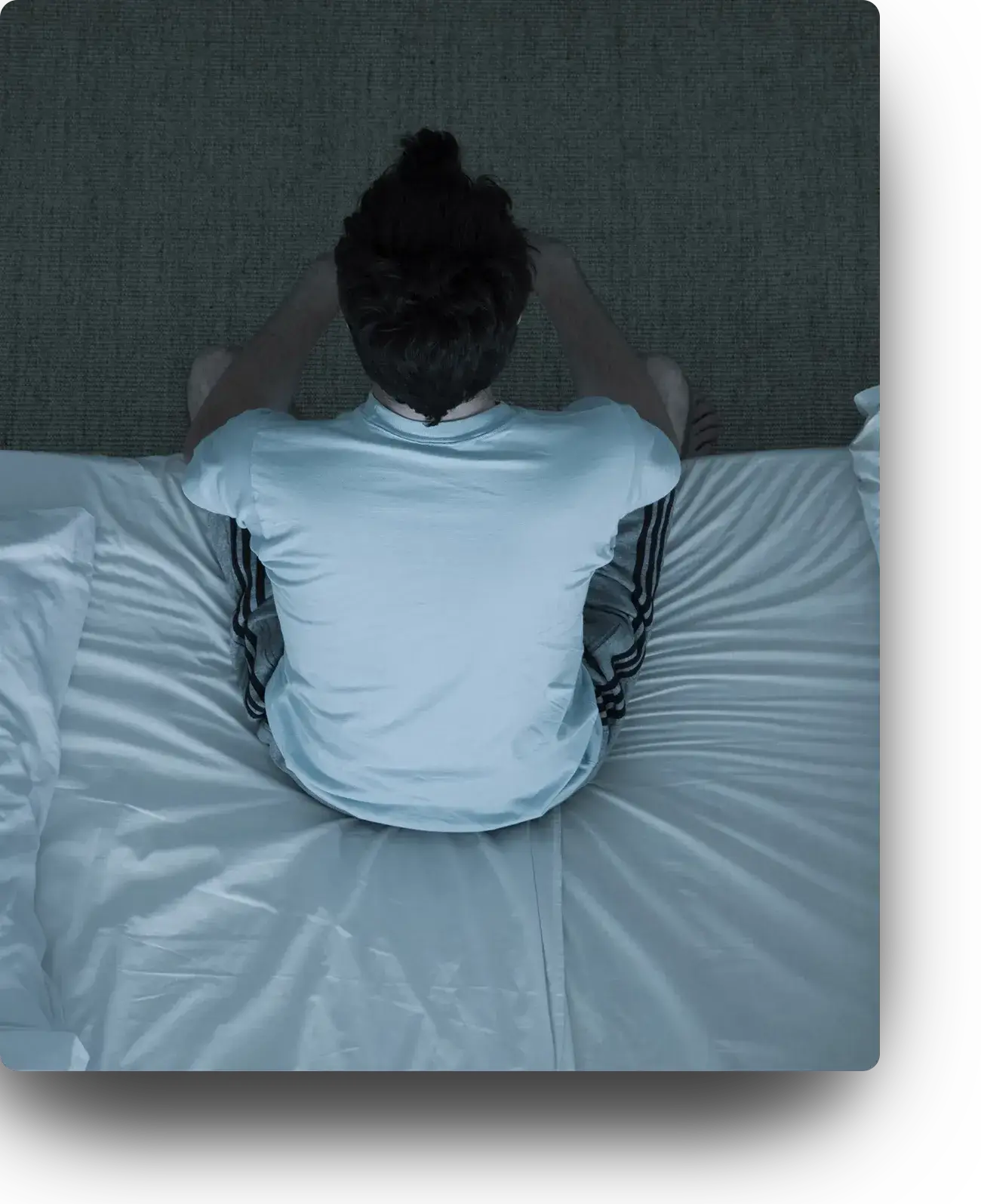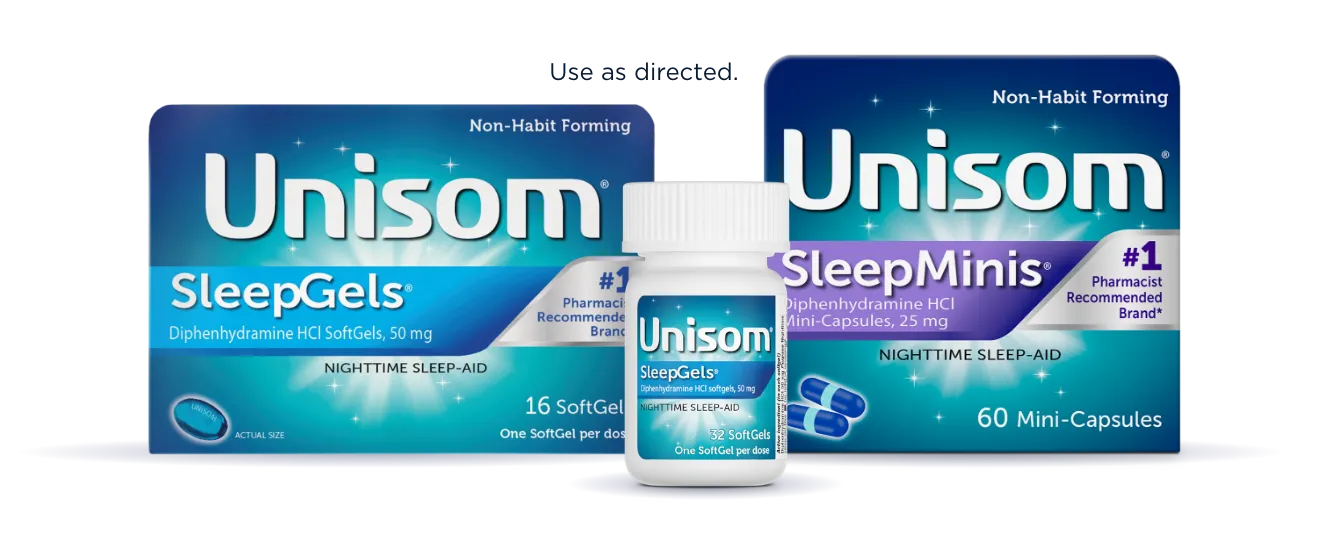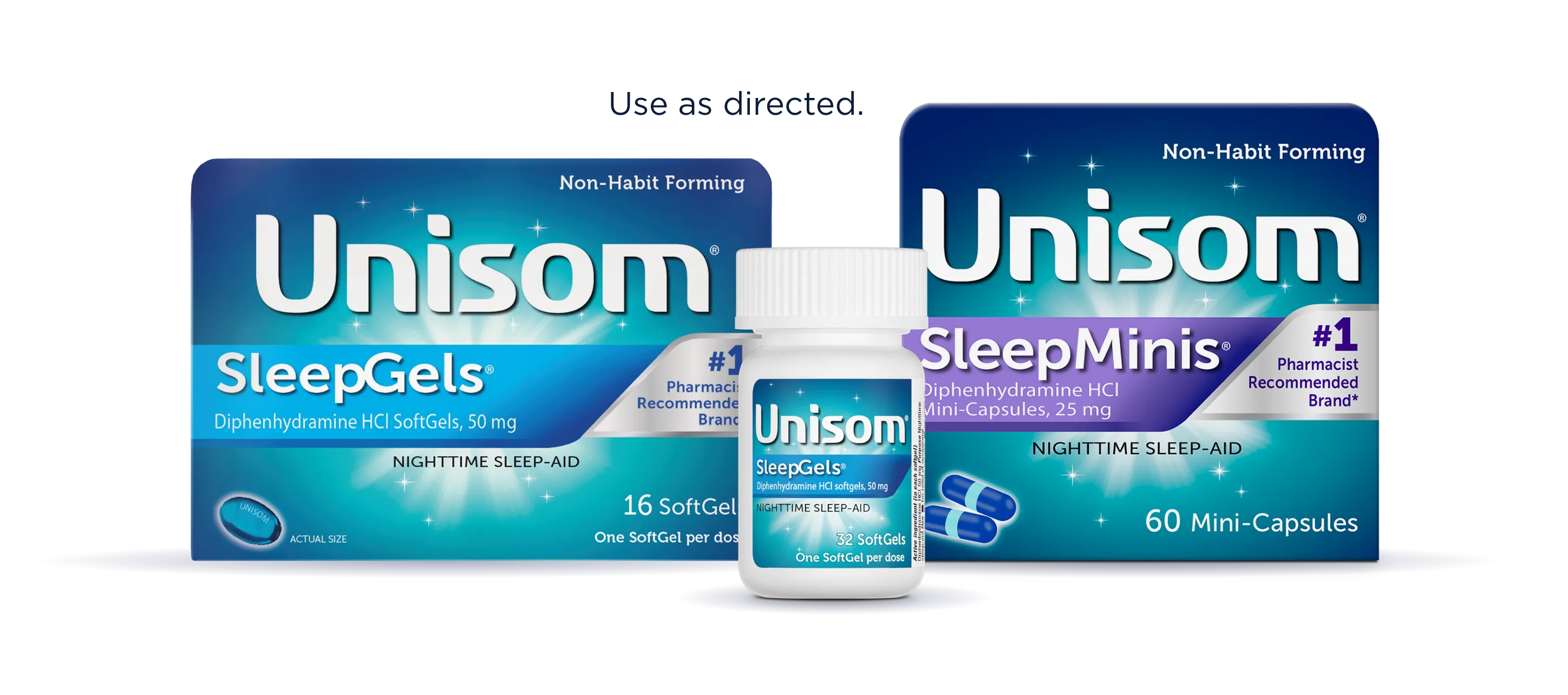It’s a tale as old as time: You’re settled into bed after a long day of work, errands, and family, and eventually fall asleep. You’re expecting to get a good night’s rest, but you wake up in the middle of the night. And, try as you may, you can’t fall back asleep—which quickly turns from a slight annoyance into a big inconvenience.
It may be helpful to know that waking in the middle of the night is pretty common. More than 35% of people have described doing so at least three times per week.1 Many factors, including unhelpful bedtime routines, a disruptive sleep environment, and stressful life events, can affect your precious slumber. But, it doesn’t have to become a completely hopeless situation. There are things you can do to help reduce your recurring rousings.
Read on to learn why you might be waking in the middle of the night, what you can do when it happens, and some tips to fall back asleep and catch some much-needed Zzzs.
Why Do I Wake Up in the Middle of the Night?
First, let’s discuss what goes into a recipe for quality sleep. A good sleep relies on a combination of elements both inside and outside of the bedroom to help you fall and stay asleep. Your activities throughout the day can impact your energy and alertness, and your bedtime routine can determine how rested and ready you are for a full night’s sleep.
Another factor to keep in mind is your circadian rhythm, or your 24-hour cycle of wakefulness and sleep. Your circadian rhythm works in tandem with your biological clock and is regulated by light, hormones, and body processes that determine when to sleep or be awake. When this timing goes off-kilter, it can cause sleep interruptions.
Some reasons you may be waking up are as follows.
Stress, anxiety, or depression
If you’re stressed out, anxious, and/or your mind is racing, it can affect the quality of your sleep, as well as other important aspects of your health. And, if stress or anxiety is awaking you in the middle of the night, know that you’re far from alone. Surveys have found a significant correlation between stress and a subpar quality of sleep.2
Stress is a blanket term that can apply to several situations. For example, work may be particularly stressful, requiring you to be up extra early or stay late in the office. Or, there could be a family situation that’s been occupying your thoughts. If your troubles with sleep also coincide with other symptoms, such as persistent sadness, feeling constantly on edge, or a loss of interest in everyday activities, anxiety or depression might be playing a role too. In any of those situations, it’s best to reach out to your healthcare provider for help.
Ultimately, waking frequently in the middle of the night can feel like a vicious cycle. You know you need to get more sleep to help alleviate stress, but your stress awakens you, which causes even more stress or sleep anxiety, and round and round it goes. Just remember, you’re not alone in this particular struggle, and there are tips to help you fall back asleep that can help break the cycle.
Acute or chronic pain
If you suffer from acute (short-term) or chronic (ongoing) pain, it can also interfere with falling asleep, staying asleep, and waking refreshed.3 In fact, the more intense your pain is, the harder it can make it to fall back asleep. If you have short-lived pain due to an injury or accident, it’s likely only a temporary disruption. If you find that you’re in chronic pain that consistently interferes with your sleep, consult your healthcare provider to find a lasting solution.
Hormones
Hormonal fluctuations are other reasons it can be hard to fall back asleep. And, unfortunately, women are more susceptible to them. Changes in the hormone progesterone, especially during menstruation, can send you on a wild goose chase for sleep in the middle of the night. Pregnancy, and later in life, menopause, can both also lead to waking up before you’re ready due to the whirlwind of hormonal changes your body is going through.
Going to the bathroom
Getting up to urinate at night, or nocturia, once in a while is a normal part of life. But doing so too frequently can be a sign of other issues that may need to be addressed. Drinking too many liquids too close to bedtime may be to blame, as can being pregnant or having an enlarged prostate. However, if you’ve eliminated excess liquids too close to lights out and are still waking to use the loo, always talk to your healthcare provider to see if there may be an underlying issue.
Medications
Certain medications may also interfere with your sleep patterns. Common culprits include alpha- and beta-blockers, SSRI antidepressants, and corticosteroids. Side effects of these can interfere with your hormones or bodily functions to prohibit a completely restful sleep. Be sure to talk to your healthcare provider if you suspect your medications are causing you to wake up mid-sleep and/or are making it increasingly difficult to fall back asleep.
Insomnia or other sleep disorders
If addressing the possible causes of waking in the middle of the night listed above doesn’t solve your sleep issues, you might be dealing with a more persistent problem such as insomnia, sleep apnea, or another sleep disorder. Consistently waking up in the middle of the night and having trouble falling back asleep is referred to as sleep maintenance insomnia (i.e. trouble staying asleep). Up to one in five people have this type of interruption.4
Likewise, if you find yourself dealing with other symptoms like excessive snoring, or even difficulty breathing during sleep, you may want to get tested for sleep apnea, a range of conditions that most commonly involve your throat muscles occasionally blocking your airway during sleep. Talk with your healthcare provider if you think you have issues with insomnia or other disorders.
5 Tips To Fall Back Asleep After Waking Up in the Middle of the Night
So, you dozed off, but now you can’t fall back asleep after waking up. Keep reading to find some ways to help fall back asleep when you’re tossing and turning in the middle of the night.
Leave the clock alone
You might be tempted to check the time when you wake up (and to keep checking it as the minutes drag on). But resist the urge as best you can. Chances are it’ll frustrate you even more and can even lead to anxiety about not being able to sleep—there’s that vicious cycle again.
Change locations & activities
Experts agree—if you can’t fall back asleep within 20 minutes or so, it’s best to try switching things up. Staying in bed can actually cause you to associate your bed with trouble sleeping, rather than being a sleeping sanctuary.5
Instead of trying to stick it out under the covers, consider reading a passage of a not-too-interesting book upright on a chair, or, even less entertaining, pick a letter in the dictionary and go wild. Once you start to feel drowsy all over again, shuffle back to bed for take two.
Light muscle movement
Another method to help fall back asleep is relaxing your body, which may help lull you into sleepiness. Try some light muscle movement, like progressive muscle relaxation, which involves tensing and releasing muscle groups in succession. An example session begins with deep breaths and your eyes closed. Then, starting from your face, tense your eyes, lips, and jaw muscles for 10 seconds each, and release.
Continue doing this with different muscle groups as you move down your body, giving special attention to the areas which may feel particularly tight or stressed. Afterwards, you may notice you’re more relaxed (not to mention, your muscles will thank you).
Mindfulness meditation
Mindfulness meditation may also help get you back to sleep. It relaxes your body by putting your focus on the present moment instead of lingering thoughts. While there are various methods of meditation, most begin similarly to progressive muscle relaxation—by closing your eyes and focusing on your breath.
An example is the body scan meditation. While sitting, notice the position of your head as it sits on your neck. Then, continue to turn your attention downward to your neck, then your torso, your arms, stomach, and so on. The goal here is to notice without judgement. If you have any sensations, let yourself be aware, but continue with the process until you reach each part of your body. When finished, bring your focus back to your body as a whole, open your eyes, and reflect on how you feel. Hopefully, you’re more relaxed.
Write a to-do list
Sometimes, it can seem near impossible to shut your mind off—especially when you have a laundry list in mind of things you have to accomplish the next day. To help quiet your thoughts, consider writing down your to-do list for the day ahead, instead of allowing it to run amok in your mind. Studies have shown that writing a list at bedtime helps people fall asleep faster.6
What To Avoid When You Can’t Fall Back Asleep
There are countless potential sleep disruptors that can wake you up in the middle of the night. So try your best to steer clear of some of the most common ones to help you slip back into a slumber.
Electronic devices
Distracting your mind for a bit with a different, low-key activity may help get you back to sleep—but only if it’s in the analogue, not digital world. For instance, reading (but only something that’s not too engaging) can be sleep-inducing, as we discussed. But reading on your phone or other electronic device can easily backfire. That’s because light triggers the wakefulness portion of your sleep cycle according to your circadian rhythm. Blue light is the biggest offender of all the wavelengths and can lead to the most stimulation. Translation: It’s best to avoid screens until the morning.
Bright lights
If you do read or get into another activity, keep any lights around you dim. As mentioned, blue light is the sneakiest culprit when it comes to keeping you awake, but any bright light can have a similar effect.
Resist the urge to sleep in
Granted, this one takes a proactive approach, but it doesn’t make it any less important. Try not to sleep in or change your sleep schedule because you didn’t get enough sleep the night prior. It’s critical to maintain a consistent bedtime and wake-time, so your body gets used to how you want it to work. You’ll likely feel tired, but keeping a regular schedule will ultimately teach your body the right cycle to follow.
Rest Assured
Despite being a common issue, waking in the middle of the night and not being able to get back to sleep can be exhausting. In addition to trying the above tips, if you need a bit of extra support, there are other options too. As the #1 pharmacist- and doctor-recommended OTC sleep-aid brand, you can count on us at Unisom® to help you fall—and stay—asleep.
Unisom® SleepGels® contain the histamine blocker diphenhydramine HCl. Blocking histamine production can help you fall asleep faster and stay asleep.
Unisom® SleepTabs® contain doxylamine succinate, which is a clinical-strength histamine blocker that works in a similar fashion to diphenhydramine. Unisom® SleepTabs® can help you fall asleep 33% faster and get a full night's sleep.
Find the Unisom product that’s right for you and download the Unisom Sleep Diary.
|
† These statements have not been evaluated by the Food and Drug Administration. This product is not intended to diagnose, treat, cure or prevent any disease. |
This article is not a substitute for medical advice. Unisom is only intended to help with occasional sleeplessness. If you are suffering from ongoing sleep concerns, seek the help of a medical professional.
Professional References
1. Shoen, Sarah. “Why You Wake Up At 4am Or the Same Time Every Night.” Sleep Foundation. 8 Sept. 2021.
2. “Stress and Sleep.” American Psychological Association. 2013.
3. Keilani, Mohammad, et al. “Sleep Quality in Subjects Suffering From Chronic Pain.” NCBI, National Center for Biotechnology Information. 7 Sept. 2017.
4. John Hopkins Medicine. “Up in the Middle of the Night? How to Get Back to Sleep. 2022.
5. “4 Simple Steps to Get You Back to Sleep Fast.” Cleveland Clinic. 16 Mar. 2021.
6. K. Scullin, Michael, et al. “The Effects of Bedtime Writing on Difficulty Falling Asleep: A Polysomnographic Study Comparing To-Do Lists and Completed Activity Lists.” NCBI, National Center for Biotechnology Information. 23 Aug. 2017.
Related Articles
†These statements have not been evaluated by the Food and Drug Administration. This product is not intended to diagnose, treat, cure or prevent any disease.



